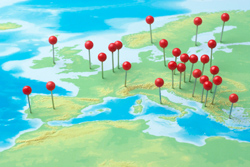International cooperation comes of age
Under the Seventh Framework Programme (FP7),a group of experts known as National Contact Points (NCP) provide assistance to potential FP7 participants in each country. INCO-NCPs help participants from countries which are part of the FP7 International Cooperation programme. To help enhance international cooperation, the 'Network of the INCO-NCPs' (Incontact) project has developed a platform to stimulate closer collaboration among INCO-NCPs. Both the NCP network and the international research community at large – including individual researchers - have benefited from the improved level of service offered by the network. This was achieved through intensive training of INCO-NCPs, increased regional awareness, and promotion of best practices in the field. For example, three awareness-and-training workshops were held in Mexico, Russia and South Africa. The workshops were tailored to the needs of the regional NCPs and incorporated a training session for the INCO-NCPs which considered local views and activities related to FP7, including presentation of the programme to the local scientific community. The regional workshops have proved a valuable means of exchanging information, sharing experience and building cooperation bridges with regional INCO-NCPs. In addition, an 'Online Encyclopaedia on International Cooperation under FP7' has been developed according to the principles of the Wikipedia online encyclopaedia, promoting interaction and the collection of best practices from all INCO-NCPs. Hundreds of registered users, exchanges, and constant updates underline the encyclopaedia's importance in promoting international scientific cooperation. Another important pillar of this project and its resulting platform has been the study of cultural differences in research collaboration. The effects of such differences have been studied extensively, and the results made available online. Thanks to this endeavour, cross-cultural communication has been enhanced, potentially transforming cultural differences into assets. A presentation is helping researchers worldwide to collaborate effectively by demystifying potential cultural peculiarities in a partner country or region. A training session on gender issues in research has also led to important findings about cultural differences.



